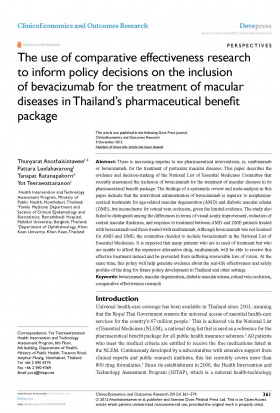This website uses cookies so that we can provide you with the best user experience possible. Cookie information is stored in your browser and performs functions such as recognising you when you return to our website and helping our team to understand which sections of the website you find most interesting and useful.
The use of comparative effectiveness research to inform policy decisions on the inclusion of bevacizumab for the treatment of macular diseases in Thailand’s pharmaceutical benefit package

Details
Abstract: There is increasing impetus to use pharmaceutical interventions, ie, ranibizumab or bevacizumab, for the treatment of particular macular diseases. This paper describes the evidence and decision-making of the National List of Essential Medicines Committee that recently announced the inclusion of bevacizumab for the treatment of macular diseases in its pharmaceutical benefit package. The findings of a systematic review and meta analysis in this paper indicate that the intravitreal administration of bevacizumab is superior to nonpharmaceutical treatments for age-related macular degeneration (AMD) and diabetic macular edema (DME), but inconclusive for retinal vein occlusion, given the limited evidence. The study also failed to distinguish among the differences in terms of visual acuity improvement, reduction of central macular thickness, and response to treatment between AMD and DME patients treated with bevacizumab and those treated with ranibizumab. Although bevacizumab was not licensed for AMD and DME, the committee decided to include bevacizumab in the National List of Essential Medicines. It is expected that many patients who are in need of treatment but who are unable to afford the expensive alternative drug, ranibizumab, will be able to receive this effective treatment instead and be prevented from suffering irreversible loss of vision. At the same time, this policy will help generate evidence about the real-life effectiveness and safety profiles of the drug for future policy development in Thailand and other settings.




